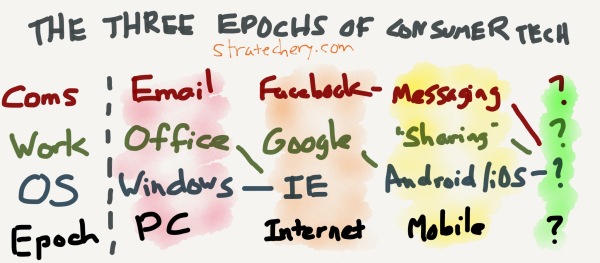I’ve been looking at the MEAN.io stack technologies (it seems like the new hotness) and I can see this being the underlying the language for the “Internet of Things”. IoT is a term that has slowly crept up into the consumer marketplace displacing the “home automation” trend, but its been in use in many other industries like supply chain and manufacturing for years. It popped up in the consumer mindshare in a big way in this years CES and MWC.
As we’ve seen the mobile space being dominated by the iOS and Android ecosystems, innovation takes place on those platforms, on their terms. IoT is proving to be the next green field1.
If you read any of Ben Thompson’s work at Stratechery.com, he wrote a wonderful article in 2014 called “The State of Consumer Technology at the end of 2014“, where he outlines what he calls the “Three Epochs of Consumer Tech”:

Extending the model below, it’s clear why people like Apple, Amazon, Google, and challengers like LG, Samsung, Xiaomi, Huawei, etc. will be leading the charge into the IoT space over the next 1-3 years.
| Epoch | PC | Internet | Mobile | IoT |
|---|---|---|---|---|
| Communications | Messaging | Voice? | ||
| Work | Office | “Sharing” | Uber, Amazon, | |
| OS | Windows | Web Browser | Android / iOS | AWS? |
| Scale | 10s of Millions | 100s of Millions | Billions | 10s of Billions |
Extending that illustration, you can map the impact of connected household goods to tens of billions of connected devices; it’s an exciting opportunity.
As with any new technology, there will always be unintended consequences. As you increase the number of connected devices by a magnitude, you’ll inevitably introduce a completely different number of variables to the equation.
Take the upgrade cycle for instance. The upgrade rate of home appliances are a magnitude longer than any phone or device.2 It’s not uncommon to keep an appliance for 10+ years. Imagine how the industry will change during that time? Whole services and protocols will go in and out of fashion. Will appliance manufacturers keep the software up to date? Surely closed ecosystems will age out and introduce planned obsolescence–look to more open development platforms to keep devices up and running in the coming years.3
A lot of interesting questions
Who will provide the fabric of the IoT:
- Clearly the underlying protocol is IPv6 in nature, but I don’t know of any emerging protocol that will take hold.
- Cisco systems is positioning themselves for this with their Jasper acquisition and OpenDNS acquisition.
Where is the hub for IoT?
- Is the living room the centre of the connected home? Both Microsoft and Apple seem to be positioning their bets there (with the XBox and AppleTV, respectively). Google’s attempts in the TV space are half-hearted and their acquisition of Nest and DropCam only address the outer-edge of the a hub and spoke model.
- Maybe there is no hub? It’s centred around the smartphone?
Who will provide the OS for IoT?
- I think the emerging leader right now is Amazon and their Amazon Echo device. I can see this being the UI for the OS. In general, it’s voice. Facebook has planted the seed that the group messaging client will be the new operating system, but their idea of mining intent from messaging using bots and NLP doesn’t pass the smell test for me (people generally don’t want Facebook looking at their chats…).
- From a platform basis it’s not so clear. Everyone will have devices running their own software. Strong brands will attempt to create walled gardens (Google vs. Apple vs. Samsung). In that sense, IoT will a horrible customer experience without some defined standards. It will take something akin to the early W3C specifications, champions on both the private and standards sized to get to something usable in my opinion.
Who are the Big players in the the IoT space?
- Will it be Apple? Google?
- I think it will be out of the hacker space from China. Only they have the supply chain expertise necessary to build the necessary sensors into devices.
What’s the big payoff for consumers?
- Is it really important to have a toaster and fridge on the Internet via IPv6? No. There isn’t. This is a difficult problem for companies. Communicating the value is difficult because it’s not very clear how all of these inter-connected devices will improve your life. Examples need to be specific.
- It’s all about the sensors and all about the software that will take that information and make it smart and insightful and enlightening–we’ve barely scratched the surface of this for consumer consumption, but we’ve seen this play out for years in in heavy and light-industry (e.g., Supply chain).
- To a lesser extent, you could say this with VR as well, but what is markedly different is the scale between the two areas. We’re talking 10s of millions of devices vs. billions, respectively. ↩
- As much as I am enticed to upgrade my aging iPad3 (from 2012), with the new iPad Pro 9.7″ launched this week, I think I’ll wait one more version. I think Tim Cook underestimates the upgrade cycle for the iPad. It’s more akin to a PC and there is no cellular phone provider to offer upgrade subsidies to catalyze its upgrade cycle like with the iPhone. ↩
- I have the same concern with automotive software–it will be interesting to see how Tesla fares. I think Apple Car and Android Auto is the future. ↩